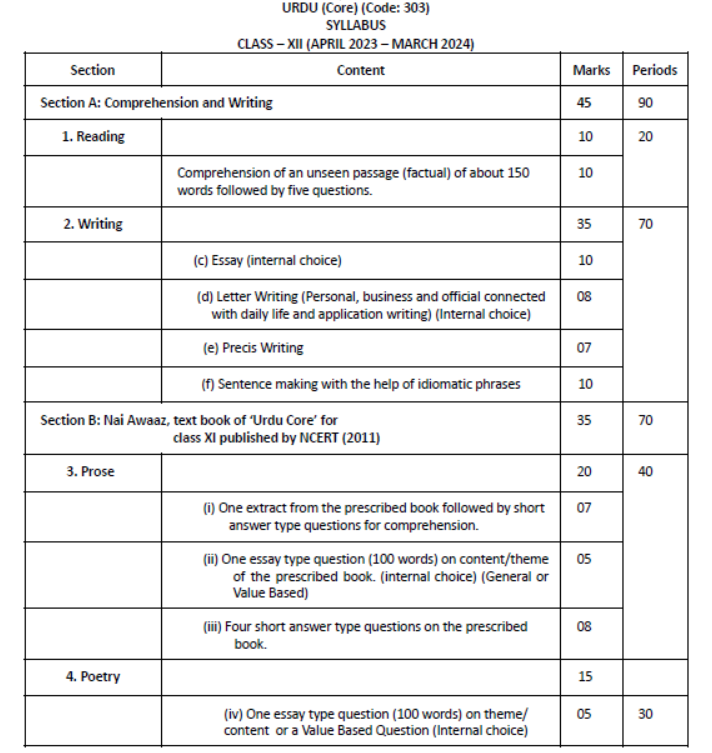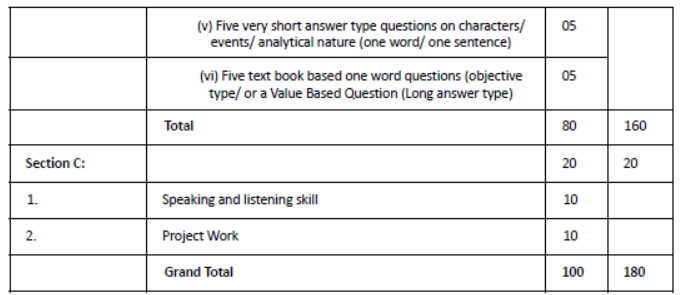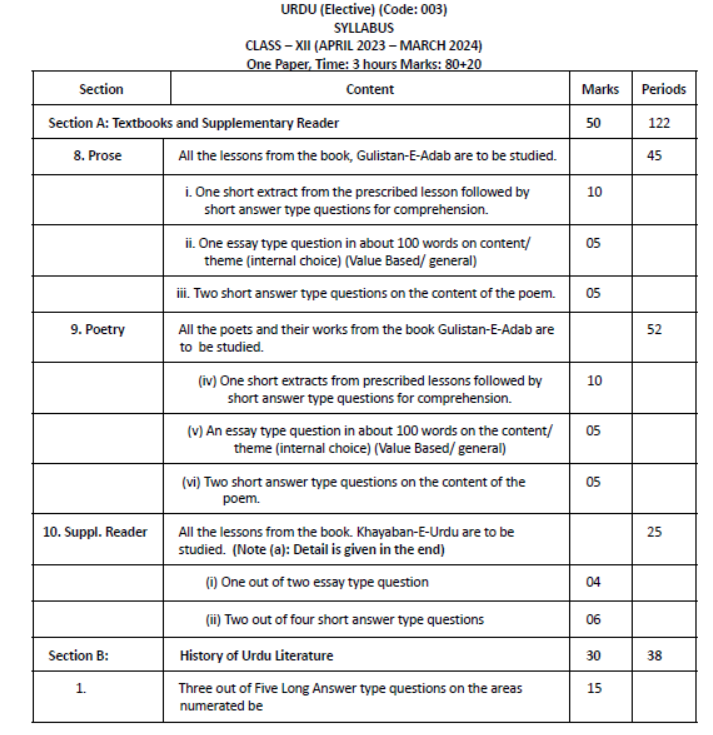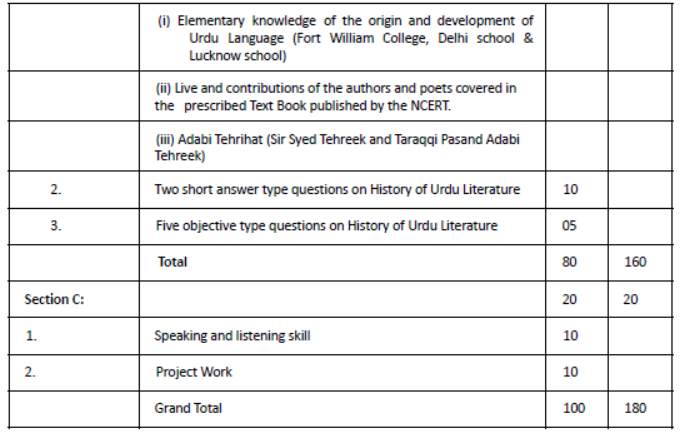Download CBSE Class 12 Syllabus for Urdu 2023 2024. Refer to the latest syllabus provided below and free download latest curriculum of Class 12 for Urdu issued by CBSE and NCERT, free download in pdf, get topic wise weightage, suggested readings and books based on latest syllabus and guidelines. The Urdu Class 12 Syllabus curriculum has been developed and issued by CBSE and NCERT for Urdu in Class 12. All students studying in Class 12 are suggested to go through latest syllabus to ensure that their preparation is as per the latest syllabus issued by CBSE NCERT KVS. Class 12 Urdu students should do preparation for Urdu exam strictly based on the latest curriculum and concentrate more on the topics with higher weightage to help them score higher marks in Class 12 Urdu class tests and exams
Class 12 Urdu Syllabus
It is important for students to study as per the latest Class 12 Urdu curriculum and marks breakup as per important topics. This will help to prepare properly for the upcoming examination. You can click on the following links to download the latest and past year syllabus provided by us below.
Year Wise Urdu Syllabus Class 12


Prescribed Books:
1. NAI AWAAZ, text book of ‘Urdu Core’ for class XI published by NCERT (2011)
Note: Following topics has been deleted: (1) Japan (safarnama), (2) Bade Bol Ka Sar Neecha (Afsana), (3) Ek Gadhe Ki Sarguzasht (4) (Jagat Mohan Lal Ravaan) Rubaiyan, (5) Phoolmala (Nazm), Chakbast.
2. DHANAK:
Note: Following topics has been deleted: (1) Aql Badi ya bhains (Kahani), (2) Boorhi kaaki (Kahani), (3) Saf Shikan Bater (Novel), (4) chiria chire ki Kahani (Inshayia), (5) Mirza Ghalib (Drama).
3. Urdu Qawaid, Published by NCERT, New Delhi
Section C-1.
DETAILS OF LISTENING & SPEAKING SKILLS
LISTENING (SUGGESTIVE ACTIVITES)
1. To comprehend the explain content.
2. To do discussions on topics taken from the textbooks.
3. To listen to News bulletins and to develop the ability to discuss informally on wide ranging issues like current, National and International affairs, sports, business and any other relevant issue.
4. Formal group discussions and their reporting.
5. Development of art of formal public speaking.
6. Listening of lectures and talks and to extract relevant and useful information and to do presentations.
7. To listen to business news and to be able to extract relevant important information.
SPEAKING (SUGGESTVIE ACTIVITES)
1. Organization of Debates.
2. Poem recitation
3. Group Discussions – Any relevant topic
4. Programme Anchoring
5. To present any event
6. Story Telling
7. Story Completion
8. Role Play
9. Reporting
10. Picture Narration – Students are asked to tell the story taking place in the sequential pictures by paying attention to the criteria provided by the teacher as a Rubric.
11. Picture Description – A single picture may be given to student/ group of student’s and they may ask to describe the picture.
12. Organization of a Seminar.
13. Presentation of a book review/ a play a short story or any other given by the teacher to be followed by a Q & A session.
14. Poetry Reading and reciting to be followed by interpretative tasks based on literary analysis of the content.
15. Critical review of a film or a play.
Note:
1. Teacher’s may develop their own rubrics to assess the performance of student objectively. 2.
It is recommended that listening & speaking skills should be regularly practiced in the class.
GUIDELINES FOR ASSESSMENT IN LISTENING & SPEAKING SKILLS
Parameters for Assessment – The listening & speaking skills are to be assessed on the
following parameters:
i) Interactive competence (Institution & turn taking relevance to the topic)
ii) Fluency (cohesion, coherence and speed of delivery)
iii) Pronunciation
iv) Language (accuracy & vocabulary)
Note:
1. The practice of listening & speaking skills should be done throughout the academic year. 2.
The final assessment of the skills is to be done as per the convenience and schedule of the school.
3. The record of the activities conducted and the marks given must be kept for three months after the declaration of result for any random checking by the Board (No recording of the speaking skill is to be done).
Section C-2
DETAILS OF PROJECT WORK
GUIDELINES FOR THE EVALUATION OF PROJECT – 10 MARKS
1. Content (Max, Word limit 1000) 2 Marks 2. Language & Vocabulary 1 Mark 3. The Pictures and data presented based on the topic 1 Mark 4. Presentation 2 Marks 5. Viva on the project 4 Marks TOTAL= 10 MARKS
SOME SUGGESTIVE PROJECTS
1. Review of any prescribed textbook
2. Critical review of any poem included in the prescribed textbook
3. History of Urdu literature
4. Nationalism
5. Freedom struggle of India
6. Secularism
7. Environmental projection
8. Rivers of India


Prescribed Books:
1. GULISTAN-E-ADAB (Barahvein Jama’at Ke Liye) published by NCERT, New Delhi
Note: Following topics has been deleted: (1) Maktoob-e-Galib Haqeer ke Nam, (2) Umrao jan (Mazmoon), (3)
Bijuka (Afsana), (4) Main, woh ( Afsana), (5) (Ghazal) Baani, (6) Mulke Be saharo-sham (Nazm), (7) Yadnagar
(Nazm), (8) Waqt ka Tarana (Nazm).
2. KHAYABAN-E-URDU (Supplementary Reader) Published by NCERT, New Delhi
Note: Following topics has been deleted: (1) Bewa (Novel) Prem chand, (2) Yahoodi ki Larki (Drama) Agha
Hashr Kashmiri, (3) Marhoom ki Yaad Mein (Inshayia) Petras Bukhari.
References:
1. Urdu Adab Ki Tareekh, Published by NCERT, New Delhi
2. Urdu Qawaid, Published by NCERT, New Delhi
Section C-1.
DETAILS OF LISTENING & SPEAKING SKILLS
LISTENING (SUGGESTIVE ACTIVITES)
1. To comprehend the explain content.
2. To do discussions on topics taken from the textbooks.
3. To listen to News bulletins and to develop the ability to discuss informally on wide ranging issues like current, National and International affairs, sports, business and any other relevant issue.
4. Formal group discussions and their reporting.
5. Development of art of formal public speaking.
6. Listening of lectures and talks and to extract relevant and useful information and to do presentations.
7. To listen to business news and to be able to extract relevant important information.
SPEAKING (SUGGESTVIE ACTIVITES)
1. Organization of Debates.
2. Poem recitation
3. Group Discussions – Any relevant topic
4. Programme Anchoring
5. To present any event
6. Story Telling
7. Story Completion
8. Role Play
9. Reporting
10. Picture Narration – Students are asked to tell the story taking place in the sequential pictures by paying attention to the criteria provided by the teacher as a Rubric.
11. Picture Description – A single picture may be given to student/ group of student’s and they may ask to describe the picture.
12. Organization of a Seminar.
13. Presentation of a book review/ a play a short story or any other given by the teacher to be followed by a Q & A session.
14. Poetry Reading and reciting to be followed by interpretative tasks based on literary analysis of the content.
15. Critical review of a film or a play.
Note:
1. Teacher’s may develop their own rubrics to assess the performance of student objectively. 2.
It is recommended that listening & speaking skills should be regularly practiced in the class.
GUIDELINES FOR ASSESSMENT IN LISTENING & SPEAKING SKILLS
Parameters for Assessment – The listening & speaking skills are to be assessed on the following parameters:
i) Interactive competence (Institution & turn taking relevance to the topic) ii) Fluency (cohesion, coherence and speed of delivery)
iii) Pronunciation
iv) Language (accuracy & vocabulary)
Note:
1. The practice of listening & speaking skills should be done throughout the academic year. 2.
The final assessment of the skills is to be done as per the convenience and schedule of the school.
3. The record of the activities conducted and the marks given must be kept for three months after the declaration of result for any random checking by the Board (No recording of the speaking skill is to be done).
Section C-2
DETAILS OF PROJECT WORK
GUIDELINES FOR THE EVALUATION OF PROJECT – 10 MARKS
1. Content (Max, Word limit 1000) 2 Marks 2. Language & Vocabulary 1 Mark 3. The Pictures and data presented based on the topic 1 Mark 4. Presentation 2 Marks 5. Viva on the project 4 Marks TOTAL= 10 MARKS
SOME SUGGESTIVE PROJECTS
1. Review of any prescribed textbook
2. Critical review of any poem included in the prescribed textbook
3. History of Urdu literature
4. Nationalism
5. Freedom struggle of India
6. Secularism
7. Environmental projection
8. Rivers of India
9. Mountains of India
10. Seasons and their Impact on life
11. Our Soldiers
12. Our Freedom Fighters (any one may be given)
13. Our Villages
14. Farmers of India
15. Biography & contribution of any author of the prescribed text book
16. Global Warming
17. Industrialization
18. Role of technology in today’s life
19. Role of multimedia in Education
20. Condition of Education in India
21. Inclusive Education
22. Population Explosion
23. Co-operative learning
24. Importance of Skill development
25. Importance of Sports in life
26. Importance of Science and Technology in life
27. Cyber Safety
28. Merits and demerits of advertisement
29. Importance of Newspaper and Magazines
30. Swachh Bharat Abhiyan
Note: Emphasis may be given on the use of computer in the preparation and presentation of project.
You can download the CBSE 2025 Syllabus for Class 12 Urdu for latest session from StudiesToday.com
Yes, you can click on the links above and download Syllabus in PDF for Class 12 for Urdu
Yes, the syllabus issued for Class 12 Urdu have been made available here for latest 2025 academic session
You can easily access the links above and download the Class 12 Syllabus Urdu
There is no charge for the Syllabus for Class 12 CBSE Urdu you can download everything free
Planning your studies as per syllabus given on studiestoday for Class 12 subject Urdu can help you to score better marks in exams
Yes, studiestoday.com provides all latest CBSE Class 12 Urdu Syllabus with suggested books for current academic session
Yes, studiestoday provides curriculum in Pdf for Class 12 Urdu in mobile-friendly format and can be accessed on smartphones and tablets.
Yes, syllabus for Class 12 Urdu is available in multiple languages, including English, Hindi


